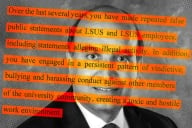You have /5 articles left.
Sign up for a free account or log in.
WASHINGTON -- The U.S. Supreme Court, in a surprise ruling Thursday, barred the government from requiring Wheaton College of Illinois to fill out a form to be exempt from the new federal requirement that employers provide health insurance coverage that includes contraceptive coverage.
The Supreme Court order says that, pending a full review of the case, Wheaton needs only to inform the government that it has religious objections to parts of the health care law. Wheaton maintained that filling out the form would violate its religious beliefs. The Obama administration a year ago set a compromise on the health care law. Under that plan, religious colleges and other religious institutions need not pay for contraception, but insurance companies that cover their employees are required to provide the coverage.
But Wheaton says that by providing basic information on the government form about its policies and its coverage providers, it is being forced to promote forms of contraception it opposes. Other religious colleges have made similar arguments.
The ruling came the same week the Supreme Court ruled -- in the case known by its plaintiff, Hobby Lobby -- that some closely held private companies could not be required to provide contraceptive coverage. That ruling cheered some religious college officials, who noted the court's concern about the religious rights of the owners of Hobby Lobby. In that ruling, however, the Supreme Court specifically said that there were other ways (such as the government paying for contraceptive coverage) that would be less in conflict with the religious views of the Hobby Lobby owners. That part of the ruling encouraged supporters of the contraceptive requirement, since that's what the Obama administration has put in place for religious colleges.
The unsigned order by the Supreme Court was quite brief and didn't offer much analysis.
But Justice Sonia Sotomayor wrote a dissent -- joined by Justices Ruth Bader Ginsburg and Elena Kagan -- that offered a detailed critique of the ruling. The dissent said that Wheaton didn't meet the tests for an emergency court ruling to block a federal law. The dissent said that the court was reversing course from the idea in its decision in the Hobby Lobby case that the government could provide contraception in ways that did not directly impose a burden on religious believers to violate their beliefs.
Further, the dissent characterized the Obama administration's compromise for religious colleges as a "simple accommodation" that did not in fact create major church-state issues.
Courts need to look at whether a law truly violates religious freedoms, the dissent said, before blocking laws. "I do not doubt that Wheaton genuinely believes that signing the self-certification form is contrary to its religious beliefs," Justice Sotomayor wrote. "But thinking one’s religious beliefs are substantially burdened — no matter how sincere or genuine that belief may be — does not make it so."ital is per Sotomayor -sj
Philip Ryken, president of Wheaton, issued a statement praising the Supreme Court. "On the eve of Independence Day, we are grateful to God that the Supreme Court has made a wise decision in protecting our religious liberty – at least until we have an opportunity to make our full case in court," he said. "We continue to believe that a college community that affirms the sanctity of human life from conception to the grave should not be coerced by the government into facilitating the provision of abortion-inducing drugs."
Different Views on Impact
What the Supreme Court's action suggests it will do in a full review of the claims of religious institutions about the health care law has been much debated in the days since the court acted.
Matthew Nelson, a lawyer who filed a brief in the Hobby Lobby case for the Council for Christian Colleges and Universities, said via email that he thought the Supreme Court's action in the Wheaton case "bodes well for CCCU institutions challenging the accommodation" because the action shows that "the Hobby Lobby majority was serious when it stated that it was not ruling" in that case on issues related to nonprofit religious institutions, such as Christian colleges.
Many legal and political observers who are advocates for women's rights blasted the Supreme Court's action on behalf of Wheaton College, saying that it suggested a willingness to let religious institutions (including colleges) deny their employees' access to insurance-covered contraception.
Others, however, argued that the Supreme Court had raised only a bureaucratic hurdle that the Obama administration could overcome. They noted that in both the Hobby Lobby case and the Wheaton ruling, the Supreme Court suggested that some system that required little of the religious employer but that ordered insurers to provide contraceptive coverage could survive legal challenges. While the particular form to which Wheaton objected might need to go, they suggested, the Obama administration could find some way to require insurers to provide the coverage that Wheaton and others want no part of. (This post from SCOTUSblog reflects that analysis.)
The New York Times reported the Obama administration is working on such approaches.








